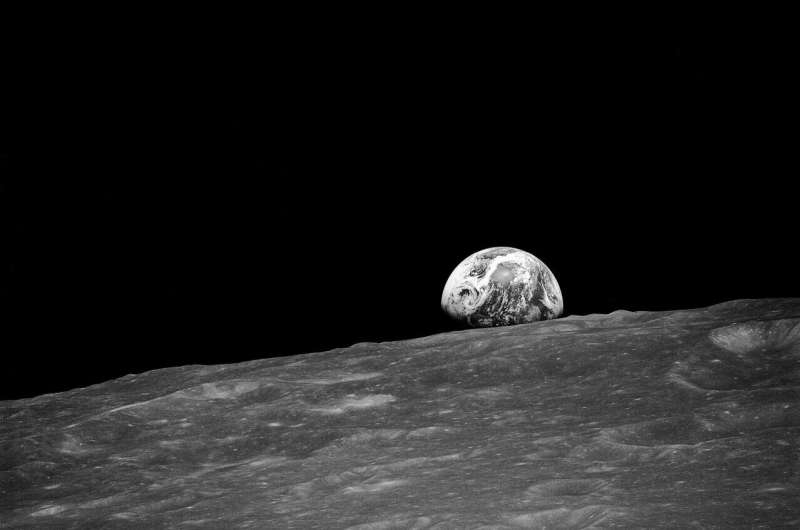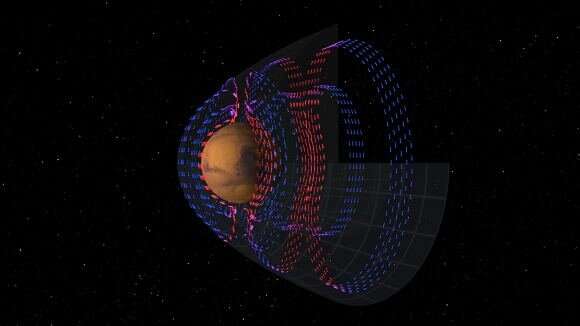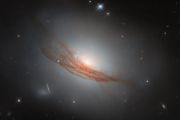
Copernical Team
Bacterial cellulose enables microbial life on Mars
 An international research team including the University of Gottingen has investigated the chances of survival of kombucha cultures under Mars-like conditions. Kombucha is known as a drink, sometimes called tea fungus or mushroom tea, which is produced by fermenting sugared tea using kombucha cultures - a symbiotic culture of bacteria and yeast. Although the simulated Martian environment destroye
An international research team including the University of Gottingen has investigated the chances of survival of kombucha cultures under Mars-like conditions. Kombucha is known as a drink, sometimes called tea fungus or mushroom tea, which is produced by fermenting sugared tea using kombucha cultures - a symbiotic culture of bacteria and yeast. Although the simulated Martian environment destroye China sends three astronauts to Tiangong Space Station
 China on Sunday successfully launched a manned mission to its Tiangong Space Station.
The three-person crew launched on the Shenzhou-14 spacecraft from the Jiquan Satellite Launch Center in the Gobi Desert at 10:44 a.m. local time with the astronauts entering the Tianhe core module at 8:50 p.m.
The astronauts - Chen Dong, Liu Yang and Cai Xuzhe - will live and work in space for six m
China on Sunday successfully launched a manned mission to its Tiangong Space Station.
The three-person crew launched on the Shenzhou-14 spacecraft from the Jiquan Satellite Launch Center in the Gobi Desert at 10:44 a.m. local time with the astronauts entering the Tianhe core module at 8:50 p.m.
The astronauts - Chen Dong, Liu Yang and Cai Xuzhe - will live and work in space for six m NASA rolls SLS moon rocket back out to Kennedy Space Center launch pad
 NASA's Space Launch System moon rocket reached the launching pad at Kenndy Space Center in Florida Monday morning after its slow-rolling 4.2-mile hike.
The trip to the historic 39B launch pad, which finished up around 8:20 a.m. EDT, will allow the rocket to be loaded with super-cold propellants as it prepares for launch around the moon later this summer.
NASA's Space Launch System moon rocket reached the launching pad at Kenndy Space Center in Florida Monday morning after its slow-rolling 4.2-mile hike.
The trip to the historic 39B launch pad, which finished up around 8:20 a.m. EDT, will allow the rocket to be loaded with super-cold propellants as it prepares for launch around the moon later this summer. Shenzhou XIV astronauts transporting supplies into space station
 Crew members of the Shenzhou XIV spaceflight have begun to transport living and mission supplies to the Tiangong space station, according to the China Manned Space Agency.
The agency said in a short release on Monday afternoon that the three astronauts - mission commander Senior Colonel Chen Dong, Senior Colonel Liu Yang and Senior Colonel Cai Xuzhe - entered the Tianzhou 4 cargo spaceship
Crew members of the Shenzhou XIV spaceflight have begun to transport living and mission supplies to the Tiangong space station, according to the China Manned Space Agency.
The agency said in a short release on Monday afternoon that the three astronauts - mission commander Senior Colonel Chen Dong, Senior Colonel Liu Yang and Senior Colonel Cai Xuzhe - entered the Tianzhou 4 cargo spaceship Beautiful Weekend Views - Sols 3493-3495
 We're heading into a packed weekend, after a successful drive putting us in a great location with some really beautiful views. Everywhere you look in the Navcam mosaic (above) there's something interesting to see!
We're up close to a nifty layered outcrop, which is getting lots of imaging including ChemCam LIBS on targets 'Rukumata' and 'Guarico,' a ChemCam mosaic on 'Kamakusa,' MAHLI dogs
We're heading into a packed weekend, after a successful drive putting us in a great location with some really beautiful views. Everywhere you look in the Navcam mosaic (above) there's something interesting to see!
We're up close to a nifty layered outcrop, which is getting lots of imaging including ChemCam LIBS on targets 'Rukumata' and 'Guarico,' a ChemCam mosaic on 'Kamakusa,' MAHLI dogs Researchers tapped again for NASA moon mission, set to explore mysterious domes

A team of researchers from the University of Central Florida will be exploring an unknown and mysterious region of the moon.
Two UCF planetary scientists, Kerri Donaldson Hanna and Adrienne Dove, have been asked to lead a $35 million mission which would land a spacecraft over the Gruithuisen Domes—an unexplored part of the moon that has left NASA scientists scratching their heads, according to a NASA press release.
The domes, which are found on the western part of the moon, appear to be the result of a rare form of volcanic eruption, according to NASA. What's mysterious about the domes is that such geological structures on Earth require oceans of liquid water and plate tectonics to form. Without such ingredients, NASA scientists are left baffled as to how the structures came to be.
Donaldson Hanna and Dove's work is part of NASA's plan to use more commercial companies to take payloads to the moon through its Commercial Lunar Payload Service program (CLPS), which is headquartered in the Johnson Space Center in Houston. The CLPS program is born from NASA's Artemis lunar exploration plans and efforts to get humans back on the moon.
What is the best radiation shielding for the surface of Mars?

The planet Mars is calling to us. At least, that is the impression one gets when examining all the planned and proposed missions to the red planet in the coming decade. With so many space agencies currently sending missions there to characterize its environment, atmosphere, and geological history, it seems likely that crewed missions are right around the corner. In fact, both NASA and China have made it clear that they intend to send missions to Mars by the early 2030s that will culminate in the creation of surface habitats.
To ensure astronaut health and safety, both in transit and on the surface of Mars, scientists are investigating several means of radiation protection. In a recent study, a team from the Blue Marble Space Institute of Science (BMSIS) studied how various materials could be used to fashion radiation-protective structures. This included materials brought from Earth and those that can be harvested directly from the Martian environment.
Seen from space, the snow-capped Alps are going green
 The famous snow-capped peaks of the Alps are fading fast and being replaced by vegetation cover - a process called "greening" that is expected to accelerate climate change, a study said Thursday.
The research, published in Science, was based on 38 years of satellite imagery across the entirety of the iconic European mountain range.
"We were very surprised, honestly, to find such a huge
The famous snow-capped peaks of the Alps are fading fast and being replaced by vegetation cover - a process called "greening" that is expected to accelerate climate change, a study said Thursday.
The research, published in Science, was based on 38 years of satellite imagery across the entirety of the iconic European mountain range.
"We were very surprised, honestly, to find such a huge Time crystals "impossible" but obey quantum physics
 Scientists have created the first "time-crystal" two-body system in an experiment that seems to bend the laws of physics.
It comes after the same team recently witnessed the first interaction of the new phase of matter.
Time crystals were long believed to be impossible because they are made from atoms in never-ending motion. The discovery, published in Nature Communications, shows th
Scientists have created the first "time-crystal" two-body system in an experiment that seems to bend the laws of physics.
It comes after the same team recently witnessed the first interaction of the new phase of matter.
Time crystals were long believed to be impossible because they are made from atoms in never-ending motion. The discovery, published in Nature Communications, shows th Putting the theory of special relativity into practice, by counting galaxies
 Scientists who study the cosmos have a favorite philosophy known as the "mediocrity principle," which, in essence, suggests that there's really nothing special about Earth, the Sun or the Milky Way galaxy compared to the rest of the universe.
Now, new research from CU Boulder adds yet another piece of evidence to the case for mediocrity: Galaxies are, on average, at rest with respect to th
Scientists who study the cosmos have a favorite philosophy known as the "mediocrity principle," which, in essence, suggests that there's really nothing special about Earth, the Sun or the Milky Way galaxy compared to the rest of the universe.
Now, new research from CU Boulder adds yet another piece of evidence to the case for mediocrity: Galaxies are, on average, at rest with respect to th 































